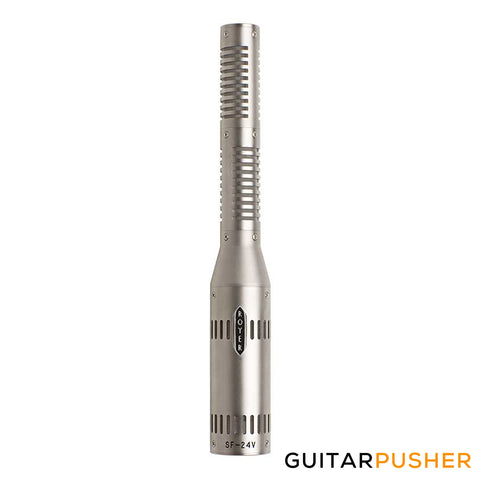
Royer Labs SF-24V Vacuum Tube Stereo Ribbon Microphone
Product Description
SF-24V Vacuum Tube Stereo Ribbon Microphone
The SF-24V vacuum tube stereo ribbon microphone is the pinnacle of our SF-series stereo microphones. The sound pickup is lush, smooth and natural, with outstanding stereo imaging and superb transient response. The tube electronics provide increased midrange reach, unmatched clarity and detail, and an airiness previously unheard of in ribbon mics. Utilizing the same proprietary tube electronics as in our TEC Award winning R-122V ribbon microphones, the SF-24V delivers the ultimate in stereo ribbon miking for the true connoisseur of recorded sound.
The SF-24V’s independent tube circuits provide an output level of -38 dB, suitable for use with any professional preamplifier. With self-noise of lower than 18 dB, the SF-24V’s ultra-quiet operation is suitable for the most demanding classical and acoustic recording applications.
Like an SF-12, the SF-24V is actually two matched ribbon microphones, placed one above the other in a coincident pair, each aimed 45 degrees from center in the classic Blumlein configuration. The magnet/pole piece structure of each ribbon transducer delivers a wide, uniform frequency response with no substantial peaks or dips, and the 1.8-micron ribbons produce superb transient response. Frequency response is excellent regardless of the angle of sound striking the ribbons and off-axis coloration is negligible.
The Electronics
The SF-24V’s twin head amplifiers consist of low-noise, triode-connected military grade 5840 vacuum tubes. Designed for a wide range of applications, the SF-24V delivers -38 dB output and the drive capabilities only vacuum tube head amplifiers can provide. The circuits are devoid of typical vacuum tube coloration.
The SF-24V’s triode-configured cathode follower circuitry enables the microphone to drive long cable runs without sonic degradation or high-frequency loss. This capability is further enhanced by the SF-24V’s dedicated power supply, which provides ample current to the vacuum tube electronics. Induced noise is virtually eliminated by the microphone’s fully balanced outputs, which are electrically isolated with special purpose Jensen output transformers.
The SF-24V has far more level than non-powered ribbon microphones and its impedance matching circuitry places a perfect load on the ribbon element at all times. This allows the use of a wide variety of mic preamps without concern for gain and impedance matches, two critical issues with ribbon microphones. In addition, the microphone’s electronics shield the ribbon elements from any possibility of damage by phantom power, electrical glitches or miswired cables.
It is important to note that the SF-24V’s higher sensitivity creates no additional self-noise. All of the SF-24V’s increased level comes from its large, specially wound toroidal transformers, so there is no additional noise associated with the microphone’s higher output. The tube system operates at less than unity, adding no noise of its own.
Recording
The SF-24V excels on full orchestra, choir and ensembles, classical piano, drum overheads, virtually all acoustic instruments, small vocal groups, a wide variety of percussion instruments, as a room mic, etc.
Like the SF-12, the SF-24V is uncanny for creating “you-are-there” stereo recordings that capture not only the instrument(s) being recorded, but, depending on how the microphone is positioned, varying degrees of the acoustical space. In addition, the increased sensitivity and impedance matching circuitry allows for more consistent results in a variety of recording situations and with a wider selection of mic pre’s.
Recording in Mono
For mono recording, phase compatibility between the two sides of the SF-24V is excellent, allowing you to combine the two channels perfectly in mono with no phase artifacts. This is particularly useful when capturing a wide sound field in mono; for instance, a singer who tends to move off the “sweet spot” of a mono microphone. Each side of the SF-24V can also be used as an independent mono microphone.
Features
- Vacuum tube circuitry provides high output and impedance matching
- True stereophonic (Blumlein and M-S) recording from one coincident microphone
- High SPL capabilities
- No distortion up to maximum SPL rating
- Extremely low residual noise
- Ribbon elements are not affected by heat or humidity
- Absence of high frequency phase distortion
- Equal sensitivity from front or back of elements
- Consistent frequency response regardless of distance
- High efficiency, matching toroidal transformers
- Very low magnetic leakage
Applications
- Orchestra
- String Sections
- Solo Strings
- Brass and Woodwinds
- Acoustic Piano
- Harp
- Choirs
- Drum Overheads
- Percussion Instruments
- Acoustic Guitars
- Large & Small Ensembles
- Ambiance
- Stereo to Mono
Specs
- Acoustic Operating Principle: Electrodynamic pressure gradient with vacuum tube electronics.
- Vacuum Tube: JAN mil-spec 5840W pentode wired in triode configuration
- Polar Pattern: Crossed figure-8's
- Generating Element: 1.8-micron aluminum ribbon
- Frequency Response: 30-15,000 Hz +/- 3dB
- Sensitivity: -38 dB (re. 1v/pa +/-1dB)
- Self-Noise: < 18 dB
- Output Impedance: 450 Ohms @ 1K
- Recommended Load Impedance: 1500 Ohms or greater
- Maximum SPL: >130dB
- Microphone Output Connector: Male XLR 7 pin (stereo*)
- Power Supply Output Connectors: Two Male XLR-3 pin
- Power Requirements: : 135 VDC @2ma (Plate Supply), 6 VDC@ 150ma from dedicated power supply (Filament Supply).
- Supply Current: 4 mA per channel
-
Microphone Dimensions: 270mm X 39mm (base) X 25mm (top) (10 5/8"X 1.5" X 1")
Weight: 583 grams (20.5 oz) - Finish: Dull Satin Nickel, Optical Black finish optional
Polar Pattern

Frequency Response






